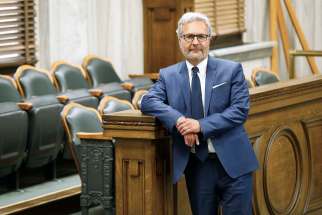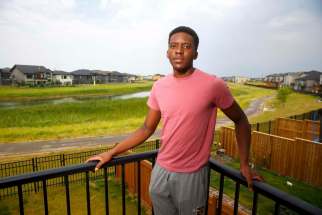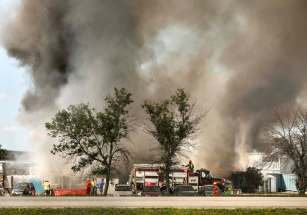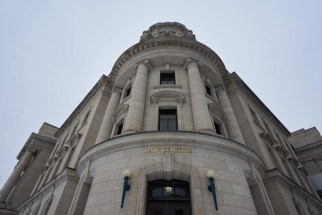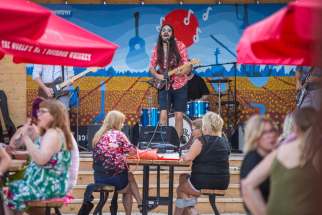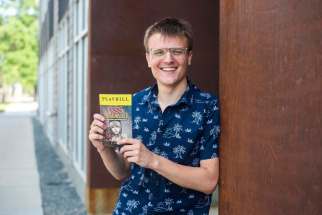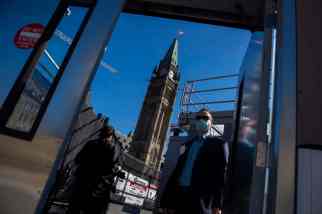After pandemic’s silence, music and night life back on stage downtown
Read this article for free:
or
Already have an account? Log in here »
To continue reading, please subscribe:
Monthly Digital Subscription
$0 for the first 4 weeks*
- Enjoy unlimited reading on winnipegfreepress.com
- Read the E-Edition, our digital replica newspaper
- Access News Break, our award-winning app
- Play interactive puzzles
*No charge for 4 weeks then price increases to the regular rate of $19.00 plus GST every four weeks. Offer available to new and qualified returning subscribers only. Cancel any time.
Monthly Digital Subscription
$4.75/week*
- Enjoy unlimited reading on winnipegfreepress.com
- Read the E-Edition, our digital replica newspaper
- Access News Break, our award-winning app
- Play interactive puzzles
*Billed as $19 plus GST every four weeks. Cancel any time.
To continue reading, please subscribe:
Add Free Press access to your Brandon Sun subscription for only an additional
$1 for the first 4 weeks*
*Your next subscription payment will increase by $1.00 and you will be charged $16.99 plus GST for four weeks. After four weeks, your payment will increase to $23.99 plus GST every four weeks.
Read unlimited articles for free today:
or
Already have an account? Log in here »
Hey there, time traveller!
This article was published 11/07/2021 (1612 days ago), so information in it may no longer be current.
It’s 6 p.m. on a Friday, and on a patch of land sandwiched between the old brick walls of two Main Street buildings, nothing could be better. It’s one of those perfect Manitoba evenings, the day’s heat carried away by a refreshing breeze, leaving socially distanced patrons to sip drinks under an unblemished blue sky.
This space has been a lot of things. It was once a hotel, then a restaurant and then, for many years, it was just a barren parking lot. Last summer, the first incarnation of the Beer Can pop-up garden took over, and now it hosts Blue Note Park, a pandemic-inspired endeavour of the legendary Times Change(d) honky-tonk bar.
On the stage, Bobby Desjarlais, frontman for rock band Bullrider, strums a few chords on his guitar and fiddles with the knobs on his amp, testing the sound. At shaded picnic tables dotted around the site, a handful of early patrons pay little attention, their voices drifting on the breeze in laughter and light conversation.
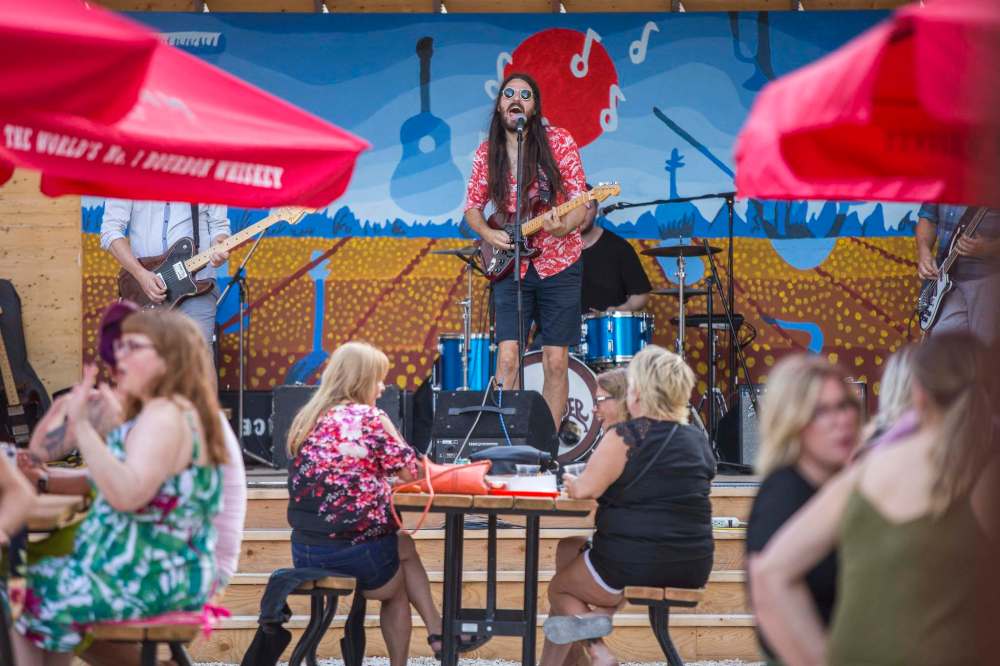
Within the hour, Blue Note Park will be filled to its 150-seat capacity. Since the venue opened on June 26, with live music for a few hours a night, seven nights a week, nearly every event has been sold out, tickets flying out the door as fans make plans to meet for tunes and cold brews under spreading picnic umbrellas.
Sometimes, the bands blink back tears onstage, just a few. Or the audience does. Between songs, sound tech Greg Rekus says, almost every bit of the musicians’ banter centres on gratitude: “Thank you, thank you,” they’ll say. Or, “We’re so happy to be playing in front of people again.” That kind of thing.
When Rekus hears that, he says, he realizes that “I wasn’t the only one that took it really hard and is starting to finally heal now.”
Rekus, a musician himself, was on tour in Philadelphia in March 2020, when the pandemic hit. He made his way back to Canada, quarantined, and began to take stock of what lay ahead. His whole life has been spent working in and around live music, which was suddenly suspended, and it wasn’t clear what would happen next.
His finances were OK: CERB helped, he says. But other than the interlude of Manitoba’s 2020 summer, when cases were low and music cautiously returned until October, the pandemic marked the longest stretch of time in his adult life that he’s gone without playing, or working at, a live music show.
“I’ve always felt such purpose out of that,” he says. “I want to play music. That’s all I’ve ever wanted to do… As the months went on, it just got harder and harder to keep hoping. When it was starting to get worse, and there was another shutdown in October… That was probably the lowest point for me.
“I just felt like everything I had worked for had just melted away.”
Now, as he flits between the equipment and his little sound booth beside the stage, it feels like “a sigh of relief,” he says. And he’s noticed, too, that the musicians arrive at Blue Note Park in really good moods: he gets more compliments on the sound than ever, he says, even if he’s not doing much.
“I wasn’t the only one that took it really hard and is starting to finally heal now.” – Greg Rekus
The other day, he and a colleague were joking that within a couple of months, feedback from musicians “will be back to ‘Is that all you can get me in the monitor?’ and ‘This amp sucks’ or ‘That amp sucks,'” Rekus says, with a laugh. “But for right now, I think we’re all kind of riding that wave.”
This night, Desjarlais and his bandmates in Bullrider are the ones riding the wave. This is their second show at Blue Note Park, and while practising during the pandemic was a challenge — backyards or parks were the only options, dependent on restrictions — they are getting their groove back.
Over the long months of roller-coaster lockdowns, Desjarlais says, he filled his time with things that mattered. He wrote songs, and focused on work, and welcomed his first child, a son, at the beginning of the pandemic, so that changed his priorities too. It was a process, he says, of revisiting what place music has in his life.
“I’ve proven to myself that it’s not my absolute everything,” he says, chatting after the band finishes its sound check. “It’s beautiful for me, and it’s what I’m most proud of in terms of my accomplishments. But I don’t think I was empty or shattered when it was gone. You gotta figure something out, right?”
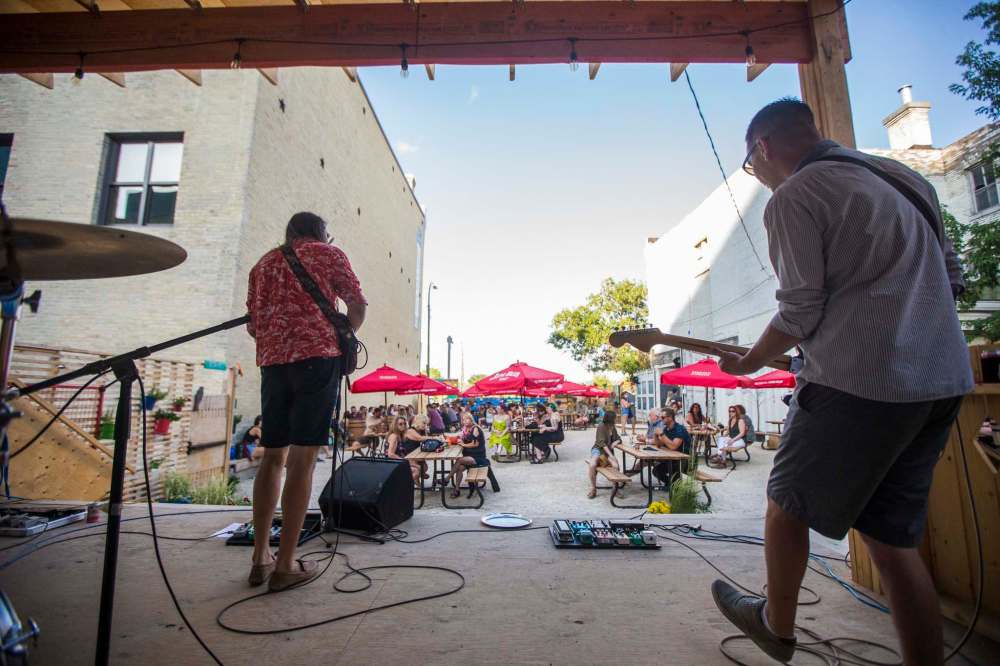
In that way, he agrees, it’s almost as if the pandemic’s first 17 months had a way of teaching people not just what they needed to live, but also what they could live without. He’d so long approached music one way, “trudging the same trail,” he says, that the pandemic restrictions offered a chance to reconsider, and realign.
Still, Desjarlais says, when he got onstage at Blue Note Park the previous week, the first time his band had been on a stage in nearly 11 months, the first 40 minutes whipped by, as if a dream. It was too much fun, and felt even something like normal. Most of all, he says, it just felt so very, very good.
“Once you get back on stage, you realize you’ve been lying to yourself one way or another to stay positive,” he says. “All of a sudden you get on stage and it’s like ‘Oh yeah, I forgot that this is who I am and this is what I love to do.’ I’m just happy to be back.”
By 7:15 p.m., the city is buzzing. A few blocks north, in the Exchange District, restaurant patios are filling up with friends out for drinks, and couples out on dates. To the south and the west, the line up to get into the Beer Can, which this year is situated in the Granite Curling Club’s parking lot, stretches about 25 people deep.
At Blue Note Park, the venue is coming alive. As the band kicks its first set into gear, Times Change(d) staff member Jesse Millar sits at the door to welcome arriving patrons, getting their names and phone numbers for contact tracing. He dances in his chair as he does this, hands waving in time to the beat.
The first day back here was “heaven,” he says. Like Rekus, he too had felt hope slipping away during the long restricted months of October through June: “Part of me was dying,” Millar says. “I looked into the void and kept thinking: ‘What if it doesn’t come back? What if this never happens again?'”
Now, it’s happening. Music on stage, a crowd full of happy fans. Some parts of it are still a little strange, like the fact that shows and drinking have to be done by 10 p.m. Prior to the pandemic, “just getting the band on before 10:30 p.m. was a miracle,” Millar says, with a grin. Still, it’s enough to keep them all going.
“I’m alive again, and I feel good, I feel real,” Millar says. “I’m not half a person anymore.”
“I’m alive again, and I feel good, I feel real. I’m not half a person anymore.” – Jesse Millar
Onstage, Bullrider finishes its second song. Many people in the crowd have been singing along, and now they clap warmly, faces turned to the stage. Before launching into the next tune, Desjarlais steps to the microphone.
“All right, it’s the second show under our belt, and the rust keeps fading away,” he says, and the crowd laughs.
At a shady table to the left of the stage, Claire Boyd, 25, sits with a group of friends, watching the band play. She dances where she is sitting, shoulders sliding to the rhythm, closing her eyes as her body sways. She’s a big live music fan — her partner is also a musician — and this is the first show she’s been to since last year.
“It was something I looked forward to days ago,” she says. “This morning I woke up and my body was just like, ready to be outside. Even though we’re all segmented it still makes a difference to hear something all together.”
True, the experience of watching live music isn’t quite normal. Under the current public health orders, there’s still no dancing allowed — “that’s OK,” Boyd says, “even if I have to be seated I can still move” — although fans use their time in line for drinks as a chance to groove, and laugh about it with each other.
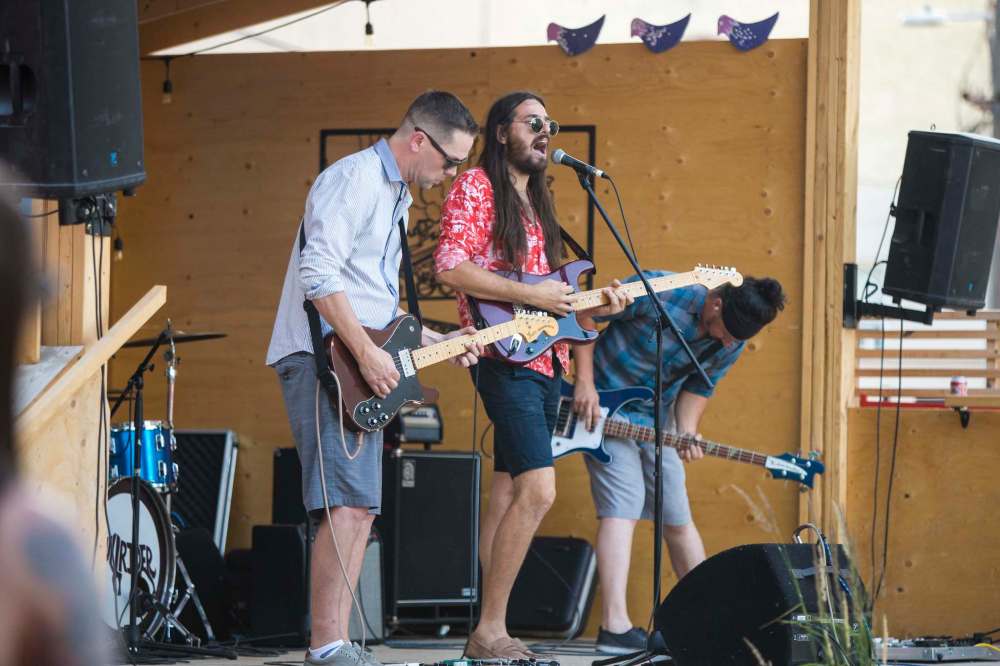
“We’re all trying to cope,” Boyd says. “I think it makes us more aware of each other.”
Outside Blue Note Park, the electric riffs from the stage fade away and mingle with the hum of the city. Traffic on Main Street is busy. It’s still light out, and though under current public health orders there’s only about an hour left till restaurants and beer gardens have to close up, the line to get into the Beer Can is still lengthy.
It’s not quite normal yet, whatever that means. Not normal, and still far from carefree. But the city sings again, on a breath made of slowing case numbers and nearly 1.6 million doses of vaccine. For this night, and the next, and hopefully many more after that, it is enough to hope that some day, it can all come back together again.
melissa.martin@freepress.mb.ca
Our newsroom depends on a growing audience of readers to power our journalism. If you are not a paid reader, please consider becoming a subscriber.
Our newsroom depends on its audience of readers to power our journalism. Thank you for your support.
History
Updated on Monday, July 12, 2021 2:12 PM CDT: fixes typos


